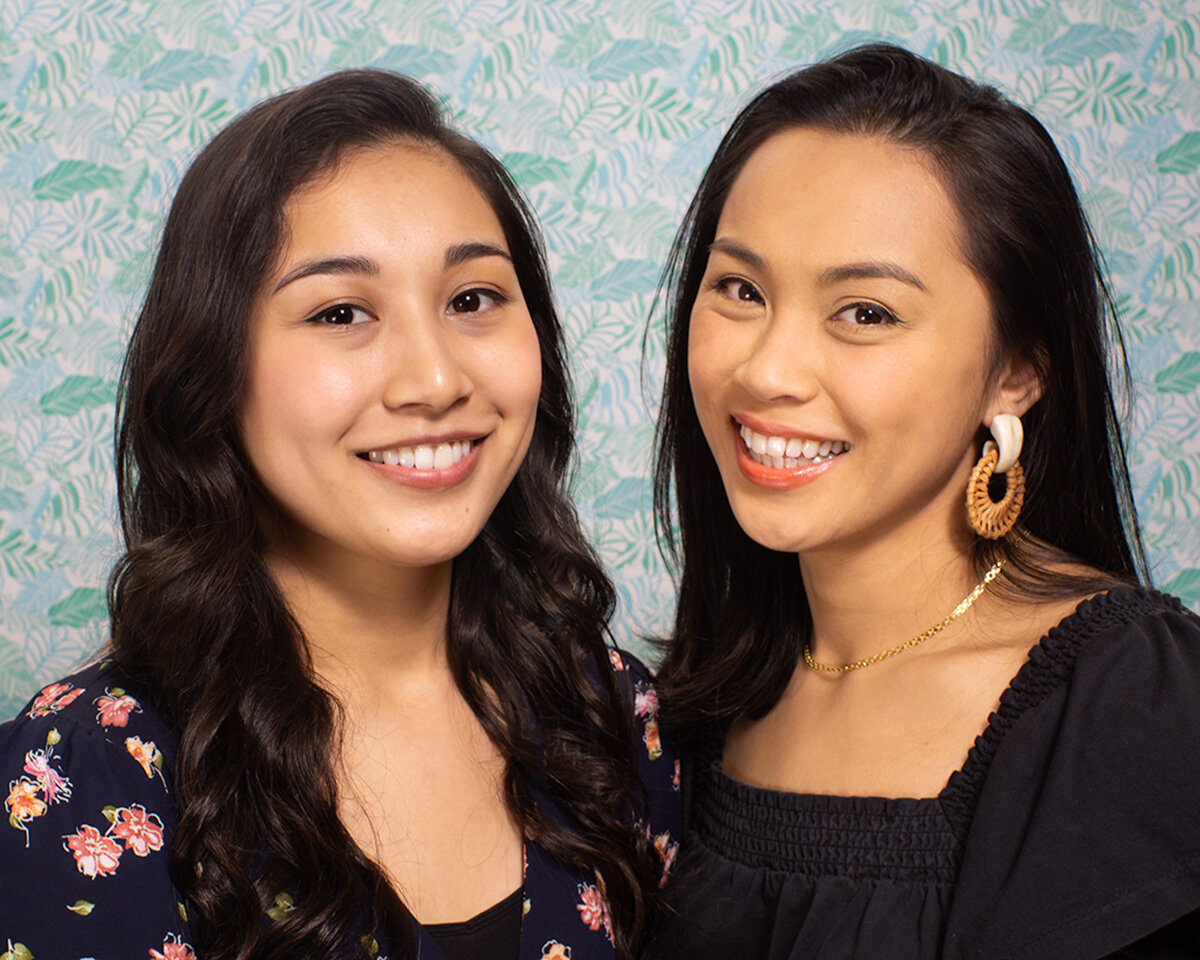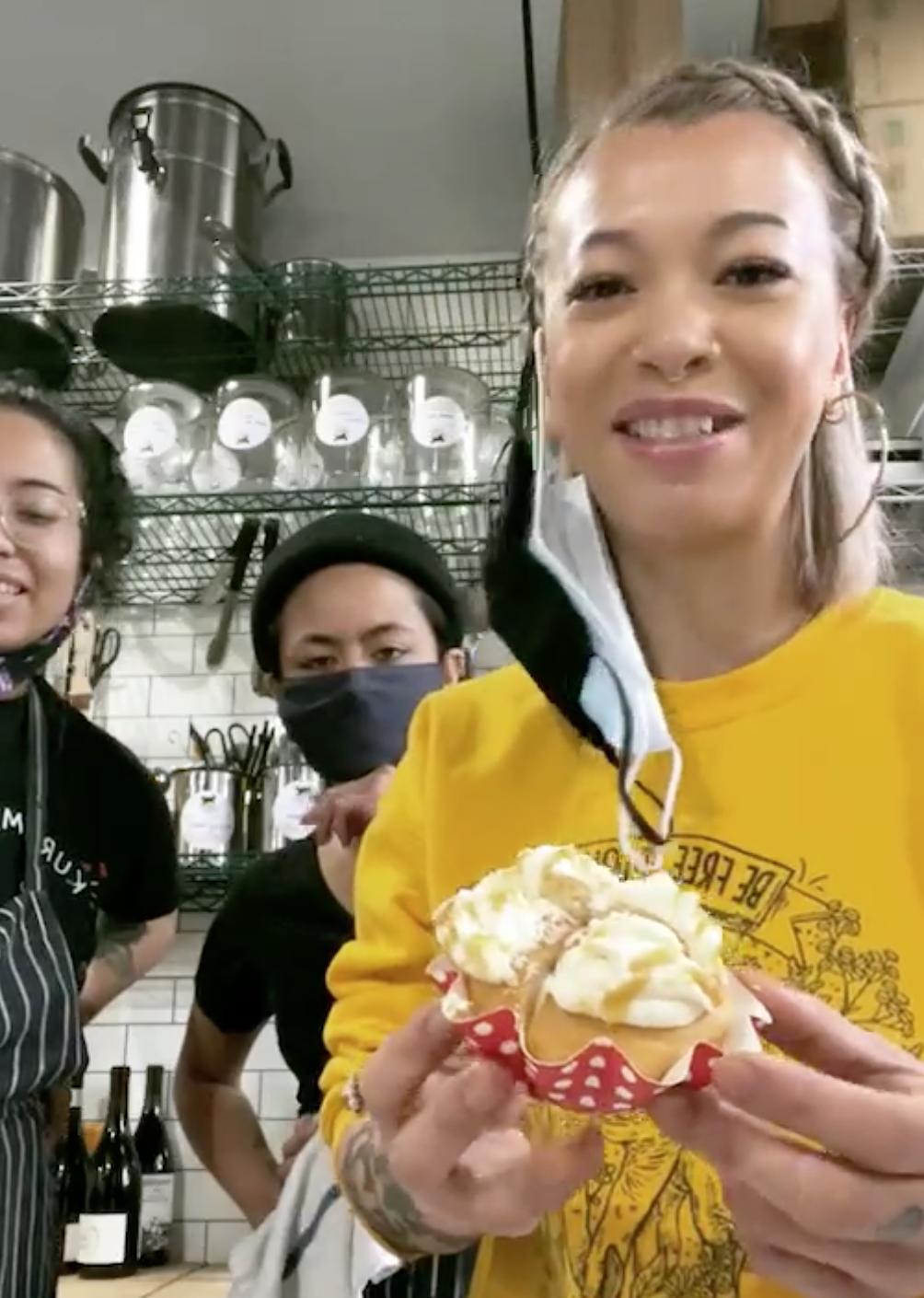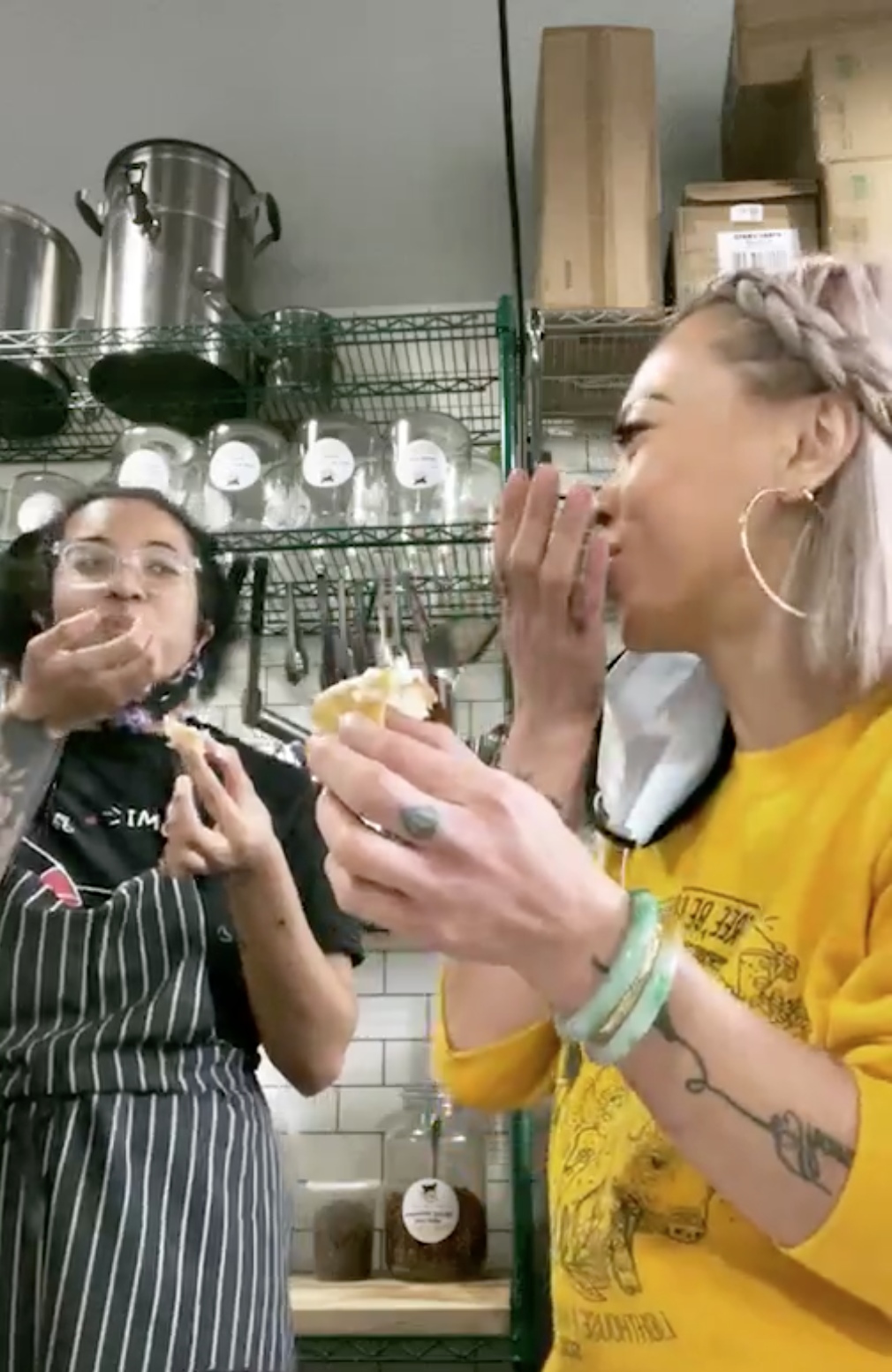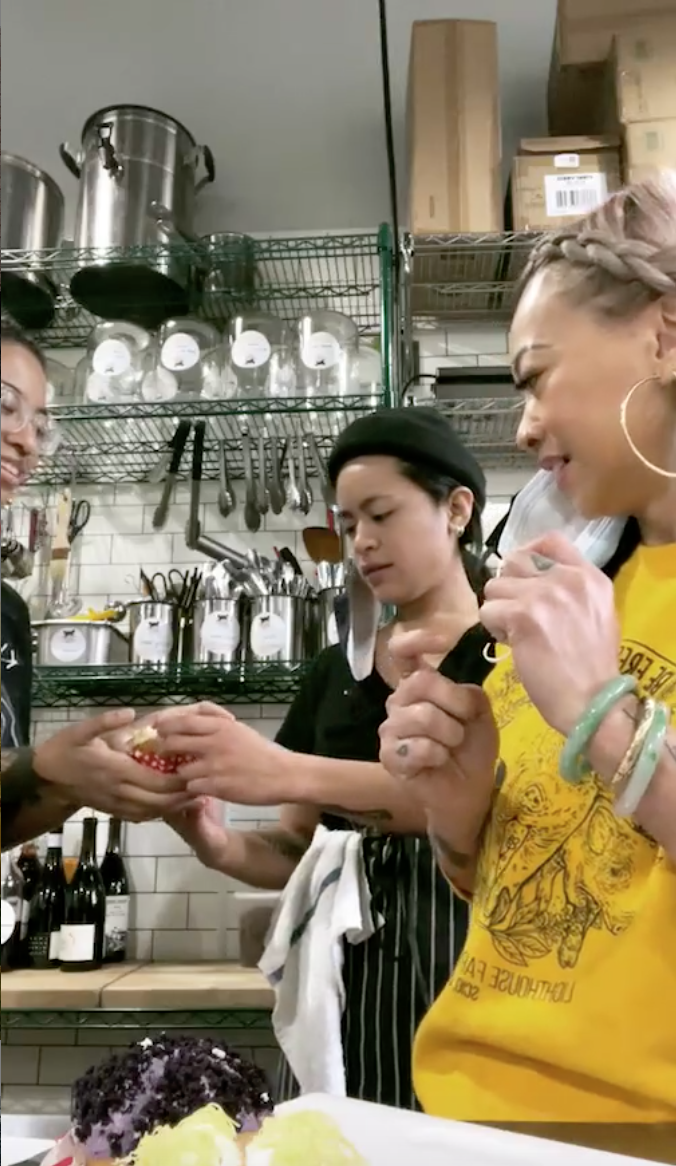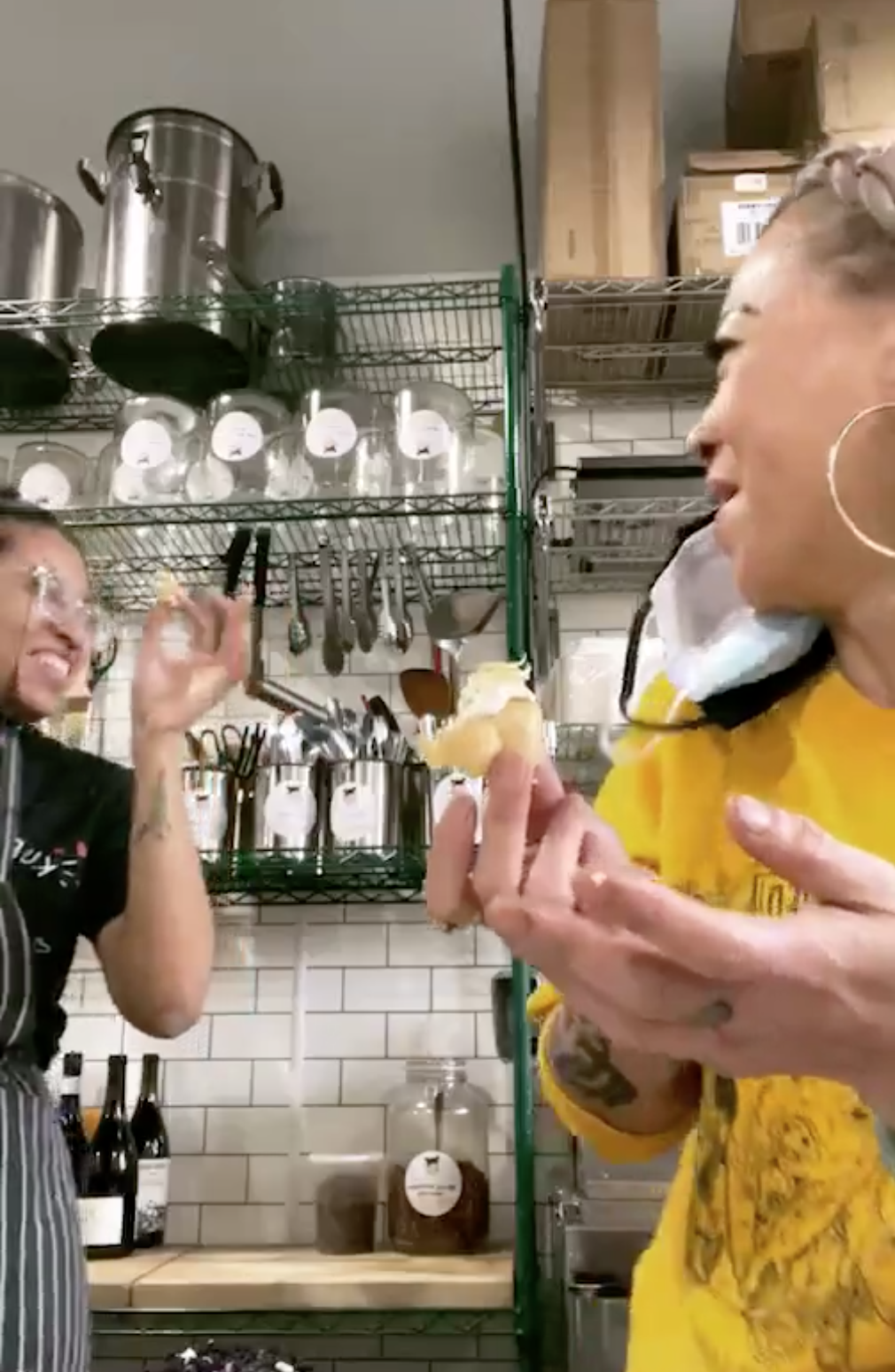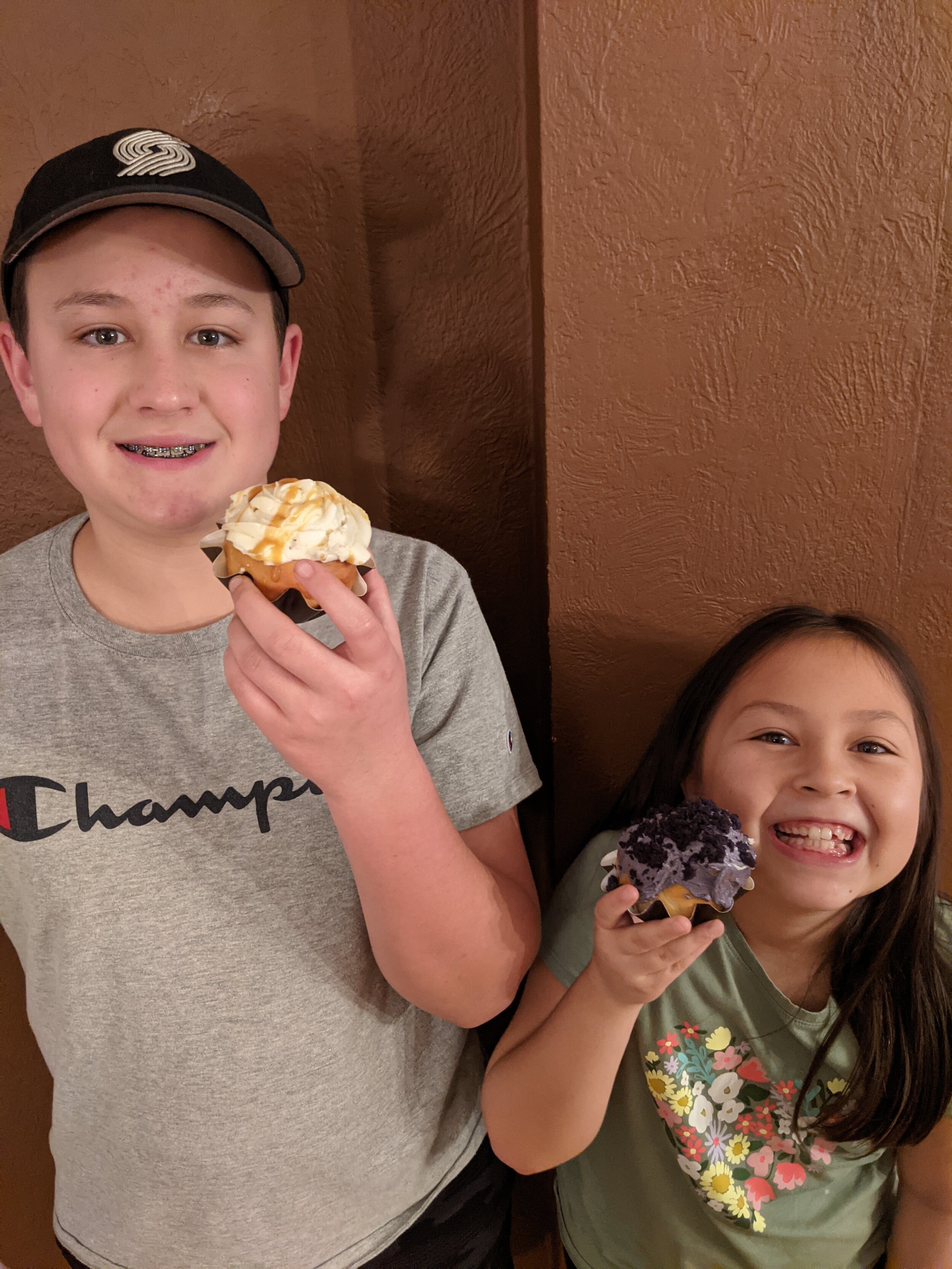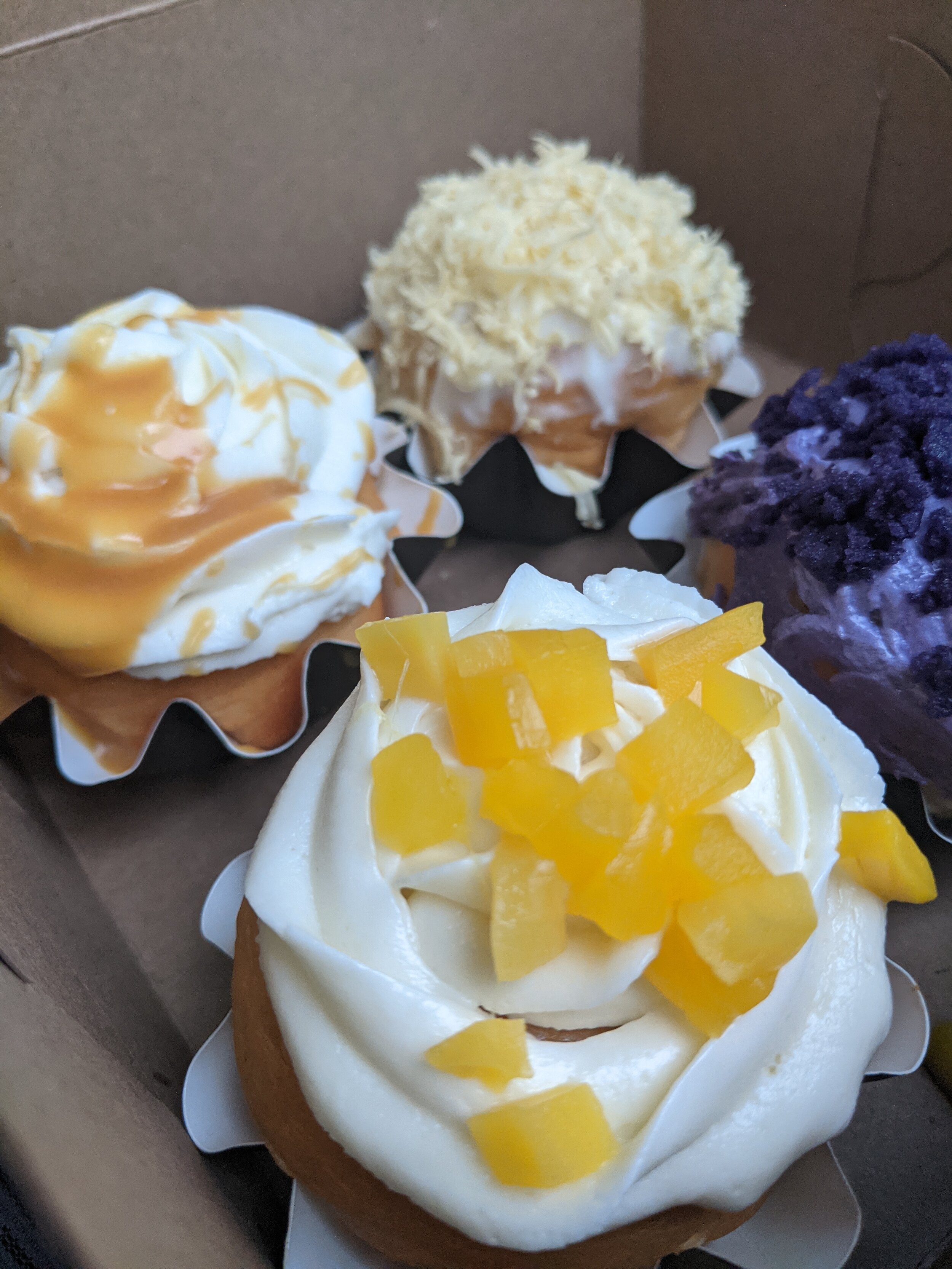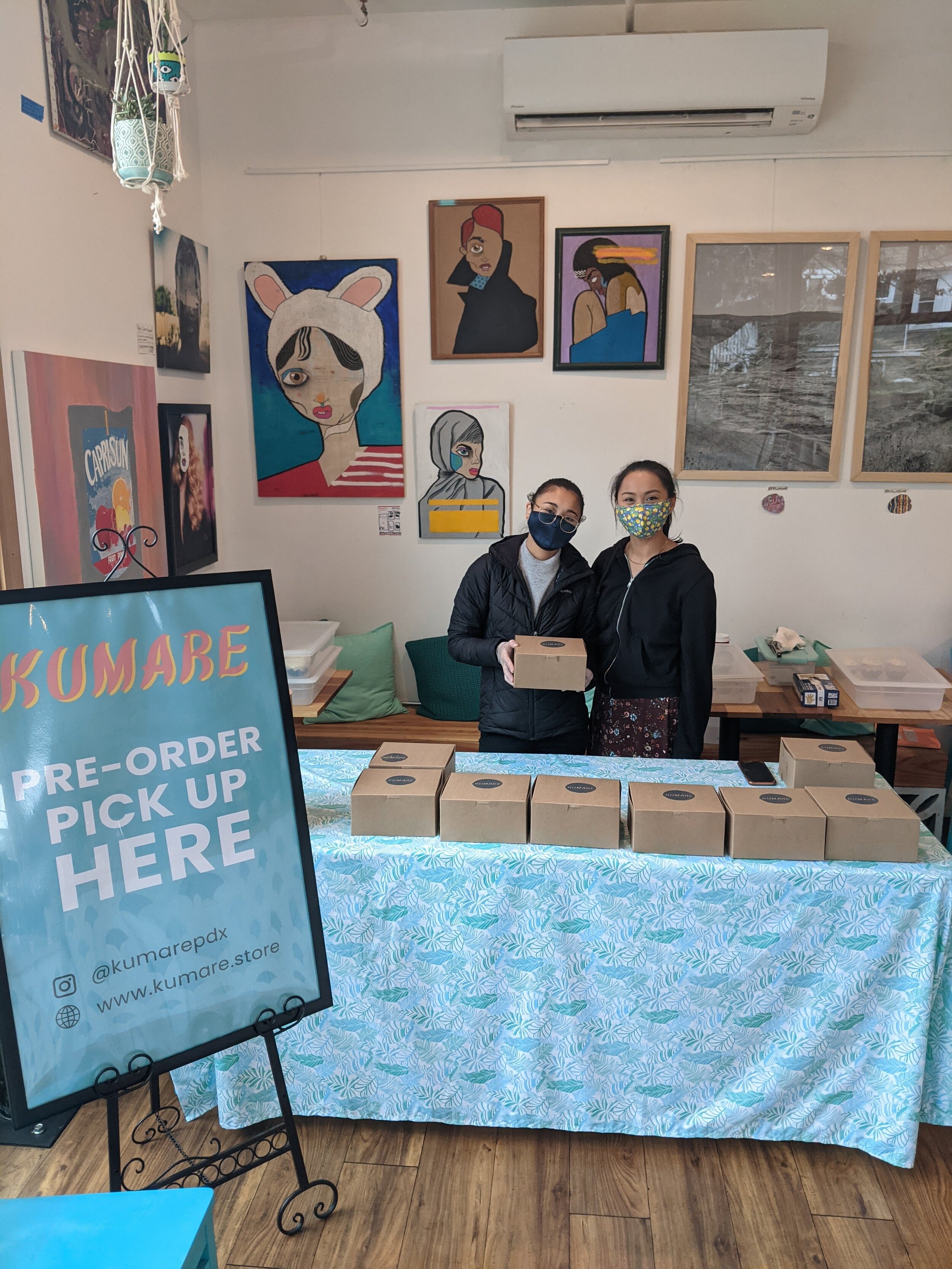Ada Chavez, Baker and Co-owner of Kumare
ALIST Women-Owned Blog Series features the story of Ada Chavez (Right) on her path to opening Kumare with her sister Carla (Left) and the mentorship of Thuy Pham, owner of Mama Dút.
The Power In Owning Your Own Space
It’s the evening before the inauguration and I’m on a video chat with Vietnamese-American Mama Dút owner and head chef, Thuy Pham and Filipina-American Kumare owner and head chef, Ada Chavez. As a biracial Filipina-American, who is also a small business owner, I felt like this call was special even before we began.
The last time I met Thuy, it was just before her successful grand opening of Mama Dút, a vegan Vietnamese-inspired restaurant she concepted in Spring of 2020. She was my first interview and the motivation for starting the Women-Owned Blog Series. Among many things we discussed that day, Thuy shared her business vision. Stepping into the space of ownership and having her own brick and mortar, Thuy knew how rare that was for someone who looked like her. Paying the opportunity forward is a Mama Dút founding principle.
Thuy opened her doors on November 7, 2020 to lines wrapped around the block waiting to taste her inventive and planet friendly menu. The buzz led to multiple articles in Eater Portland and a feature in Thrillist and Portland Monthly. Her success attracted a partnership with Quorn Foods that launched in January 2021. Not many know, that in the middle of it all, she was already sharing her kitchen and knowledge with Filipina-American sisters, Ada and Carla Chavez in early December.
On January 8, 2021 pre-orders went live for Kumare’s Filipino vegan desserts called ensaymadas, a delicious cinnamon roll-like bread topped with flavors of the Philippines and sweet vegan buttercream. Within 24 hours of going live on their website, Ada and Carla were sold out. On January 12th, Mama Dút hosted its first pop-up restaurant to happy customers. Kumare was in business and so was Thuy’s vision.
I got the chance to sit down with Thuy and Ada to talk about how everything came to be.
“If 2020 taught me one thing, it’s in order for things to happen you gotta put it out there first.” Thuy starts off. All three of us nod our heads in agreement and laugh because we all learned this lesson last year.
Thuy shares that she and Ada have a mutual friend who reached out to Thuy on Ada’s behalf. Ada was following Thuy on Instagram and was interested in hosting her own vegan pop up someday, but had lots of questions. Thuy got her start doing pop-ups and collaborations with Growing Gardens. She received a lot of support from the industry and her customer-base grew quickly. Paying that generosity forward was always her intention.
“Anytime I can offer my knowledge to help someone, I’m going to do it. We scheduled a Facetime call and Ada brought her questions. I shared my insights where I could and she told me they were still working through their recipes. With me off on Mondays and Tuesdays, I offered the Mama Dút kitchen to them for free. Honestly, it all sorta lined up. I’m just here to support. Hopefully, it’ll change the landscape someday.”
The tone in Thuy’s voice gives the impression she doesn’t think this gesture was such a big deal. Many restaurants sit empty on the days they are closed. Thuy wasn’t going to let that happen in a space she owned. That’s when Ada chimed in.
“This was really big for us. It’s really hard for BIPOC, especially women, to ask for help. In Asian cultures it can sometimes seem like a form of weakness. So me asking my friend for a connection wasn’t easy for me. I have a background in the food service industry that started when I was 16 years old, but I didn’t know how start a food business. I’ve worked in the system for a long time, but typically all the owners are white and male. There wasn’t anyone that looked like us.”
I can’t help feeling empowered in this moment. Three women business owners and brown Asian faces looking at each other in solidarity. All on the night before Vice President Kamala Harris is sworn into office. I got goosebumps.
Thuy adds, “the education required to get into ownership is not made accessible to us. The fact that you were in the industry for so long and didn’t know how to make the transition to owner is bullsh*t. It’s gate keeping. The industry wants our labor as a proof point of representation, but that’s not real representation. You need to give me the keys to the kitchen, put me on your level, and show me how to do what you do.”
Ada and Carla, owners of Kumare, boxing up their ensaymadas in the Mama Dút Kitchen.
Ada continues. “Yes, exactly. I feel so fortunate I was able to connect with someone like Thuy who is a BIPOC woman restaurant owner. I could ask my questions and feel empowered in myself. I quickly started to think this might be possible. I can do this.”
Thuy explains. “It’s much easier to ask for help from someone that looks like you than it is to ask someone who looks like someone who has wronged you or been prejudiced to you or exploited you in the past.”
Her words trail off and we sit in silence for a second. I knew this point was powerful and I was grateful to be listening. We were all connected by that common thread Thuy hit on and it made our bond stronger. We need each other to overcome and strive for equity in a world not designed for us to succeed. If we combine our power we can change things. Showing ourselves take risks and supporting one another with each turn of inherited wisdom is a choice we can make in our lives. I started this blog to feature the stories of women owners to increase awareness of representation and to inspire others. What I didn’t know is how healing these conversations would be for me and the honor that comes from telling these stories. We set out to talk about the newest vegan pop-up sensation Kumare, but the conversation hovered over the urgency for women to support women, especially in the new Covid realities of so many women leaving the workforce.
“Honestly, for me I don’t want to be in a room full of white male owners. I have no allies. But the more women of color I can get in that room of owners the more allies I have. I want Kumare to succeed, especially in the vegan food world in the United States. We need more representation. I heard on the How I Built This podcast that ‘women of color are the leading demographic of people in the United States who are opening small businesses and becoming entrepreneurs.’ At the same time, ‘only 1% of venture capital investments go to women of color.’ So even though we are leading in growth, we are getting very little funding. I repeat this just about every day. It makes me emotional when I hear it too. What kind of boss babe or leader would I be if I didn’t help change that in a real way and not just talk about it?”
I couldn’t agree more with Thuy. Her passion for closing that gap is what brought us together today. We are all here to support the continued success of new entrepreneurs Ada and Carla. The sisters were drawn to Thuy because they saw themselves in her. However, when they were given the space and kitchen to test our their ideas, that’s what brought everything together so quickly.
“We decided to do a trial run. To see if the kitchen could work and figure out how many we could make. That was the day we dropped off our first box to Thuy and she loved them. Right after that we scheduled our first pop-up.”
“I didn’t expect such a strong emotional reaction to come from a donut. I brought the box into work to share with my employees who are Filipinas. We decided to go live with the tasting and my employees were tearing up. Food like that, should be shared. And if we don’t document, learn, and practice how to make these traditional recipes, it’s going to get lost.”
“I fear that sometimes,” Ada adds.
So how did Ada do it? We dig into the logistics of what it takes to launch a business. Ada’s sister and co-owner Carla has a background in graphic design and web development. Ada’s partner has a BFA in photography. Together they created the brand and online presence for Kumare. Ada leads the food vision and execution. In order to reduce the amount of food waste, they decided to do a pre-order on Friday, much like Thuy’s current business model at Mama Dút, and then made a pick up time between 4pm-8pm on the following Tuesday. Mama Dút typically sits empty Mondays and Tuesdays so it worked out perfectly. 30 minutes before the doors opened for pick up, the sisters completed their last box with their mom’s help who has 20 years of experience as a server. It was a total family affair. Ada and Carla stood with pride at the front of the store, passing out the boxes to their new customers. I ask Ada how they decided to start their pop up with ensaymadas.
“There is a lack of Filipino treats and delicacies here in Portland. Growing up in Southern Oregon there was nothing there for us. We’d go to Southern California and shop at the big Filipino grocery stores. My parents would always get trays of ensaymadas for us to eat on the way back. It is such a strong and special memory for me. Love is ensaymadas for me. I wanted to bring that to Portland.”
The Ensaymada Box contains four flavors Ube, Jackfruit, Dulce de Leche, and Classic Cheese. Kumare’s pre-order was supposed to go through the weekend. However, the maximum quantity they wanted to sell at their first pop up, 400 ensaymadas, was already ordered in less than 24 hours. I was lucky to get my order in on time. Even though I’m Filipino, I’ve never had ensaymadas and neither have my kids. Sharing that beautiful box of sweets with my family, at the start of the new year, is something I will always remember.
Thuy was a forcing function for Ada and Carla to get passed their insecurities. With a free kitchen, store location, and mentorship, these two sisters weren’t going to squander that opportunity.
“The biggest take away we learned from Thuy is you just gotta do the work. Get passed the fear and do it. It’s only then that you can see what you are capable of doing. It’s really hard to start, but once we did it we were already planning for our next pop up.”
The demand is there. Kumare had another pre-order on January 22nd and sold out in less than an hour. DMs on Instagram are flooding in asking for even more nostalgic treats to be added to the menu. Ada and Carla saw a gap in the market. With Thuy lifting them up, they changed it over night and introduced Filipino brioche to PDX. I am so excited to watch what else these incredible women will do in 2021. Let’s all continue to hold onto your sisters because we are who we’ve been waiting for.
Thank you Ada and Thuy for sharing your story.
Feature photo credit: Scott King
ABOUT THE WRITER
Amanda Mailey is the owner of ALIST and a new indie author who released her first book sidetracked in July 2020. She’s a lifelong writer specializing in observation and reflective narrative. She grew up in Oregon and graduated with a journalism degree from the University of Oregon.
As a mixed race Filipina-American woman, Amanda is passionate about advancing women- and bipoc-owned small businesses and leaders in her community. Through this blog series and social media, Amanda centers and promotes the stories and achievements of local women owners.

